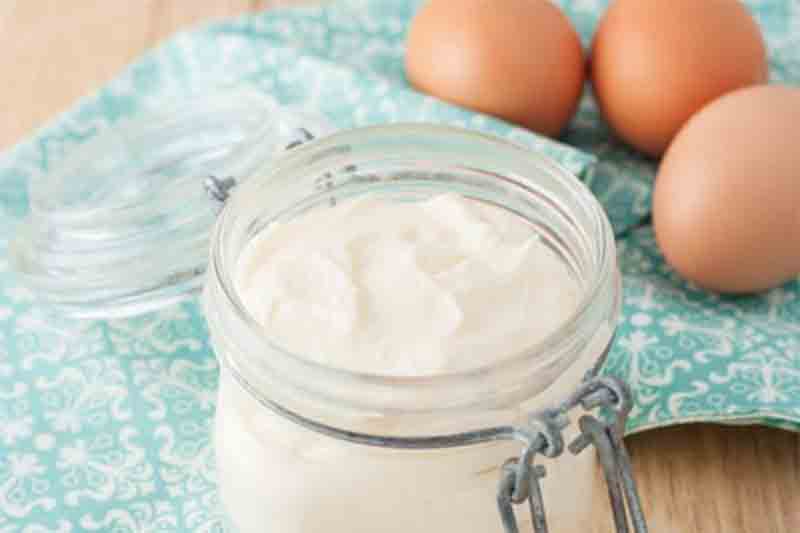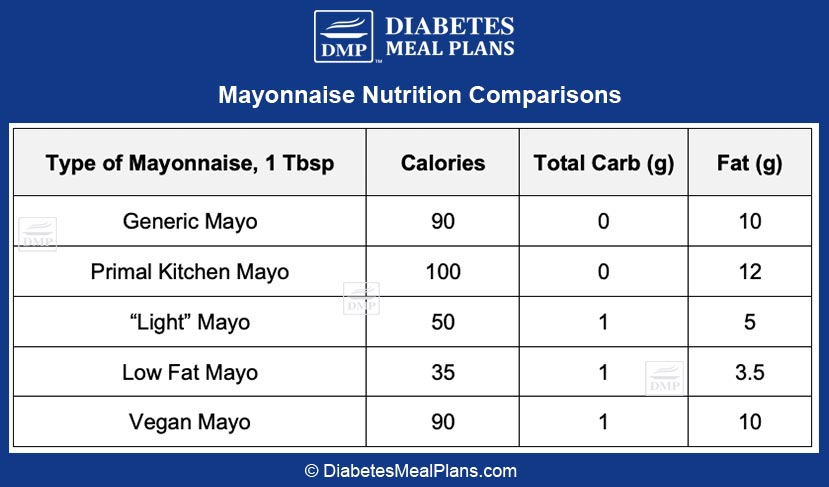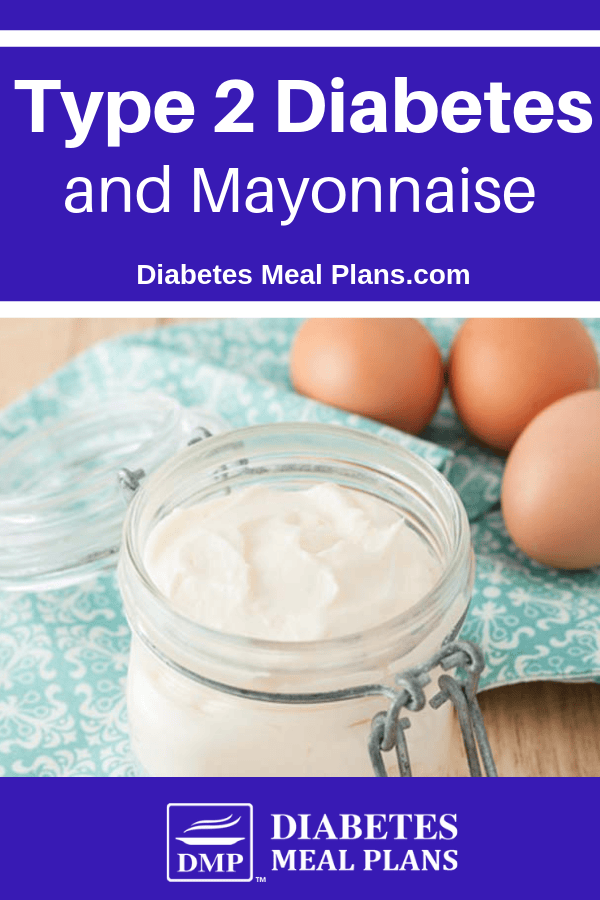Sometimes the best part of a meal isn’t the main course itself, but all the trimmings.
Think about a juicy hamburger. It wouldn’t be complete without a fresh slice of tomato, a few rings of onion, a leaf of lettuce…and let’s not forget the condiments!
Condiments like mayonnaise are what make food look and taste great, and we want to help you keep as many “yes” foods as possible in your menu while you transition to a healthier diabetes diet.
So if you’re looking for tips on how to find a clean, healthy mayonnaise look no further…

What is Mayonnaise?
Mayonnaise, shortened to mayo, is a creamy condiment that is popular all over the world. You can put in on a hamburger, mix it into a salad dressing, or use it as a tasty dip for your veggies.
While we often think of mayo as a simple spread for sandwiches, it’s actually a super versatile condiment that can be used in all kinds of creative ways around the kitchen.
The main ingredients in mayo are typically eggs and oil, which naturally makes it a very high-fat food. In fact, fat is the only macronutrient that mayonnaise contains!
Let’s take a closer look at that…
Mayonnaise Nutrition Facts
One tablespoon of generic mayonnaise contains the following:
- Calories: 90
- Carbohydrates: 0g
- Fiber: 0g
- Protein: 0g
- Fat: 10g
As previously mentioned, mayo is predominantly fat with only trace amounts of other macronutrients. There is little protein, fiber, or carbohydrates to be found, which may sound extremely “unbalanced,” but this doesn’t necessarily make mayo an unhealthy food.
For one, mayo should be used in addition to an already balanced meal—it makes a great creamy base for a salad dressing or a hearty egg salad. You’re (hopefully) not going to eat a bowl of just mayonnaise for dinner. 😆
Secondly, it’s important to remember that high-fat foods aren’t inherently bad for you. Fats can be healthy or unhealthy depending on the source.
This leads us into a quick run-down on the difference between “healthy fats” and “unhealthy fats.”
Healthy fats like avocado oil and olive oil and are rich in monounsaturated fats, which can improve your glycemic control and lower your cholesterol levels (yes, you read that right…eating fat may lower your cholesterol!).
Foods like eggs and coconut oil are higher in saturated fat, but this is OK since they are whole foods that are nutrient dense.
However, not all fats are equal. The saturated fats in highly processed foods like ice cream, frozen pizza, and doughnuts are not so good for your heart or your waistline. The point being, saturated fat in whole unprocessed food is very different to those found in processed foods.
Finally, we have polyunsaturated fats like soybean, canola, corn, and vegetable oil. Polyunsaturated fats aren’t always bad for you but many of these oils are high in inflammatory omega-6 fats and they are highly processed. So it’s best to stay away from these.
Now that you know which fats to keep an eye on, let’s compare a few different kinds of mayonnaise.
Comparing Types of Mayonnaise
There is definitely a range of mayo options out there these days; from normal mayo to vegan mayo to paleo-approved mayo, you’ve got a lot of choices to make.
Let’s start with a basic breakdown of the nutrition facts for five different types of mayo.

On top, you’ll see regular mayo followed by “light,” low-fat, paleo, and vegan mayos.
Right off that bat, you’ll notice that, with the exception of the low-fat and “light” options, the other choices are all similar in fats, carbs, and calories. The real difference lies in the ingredients.
The generic mayo contains soybean oil as it’s main ingredient besides the eggs whereas the vegan mayo doesn’t contain any eggs at all and uses canola oil instead.
Both soybean and canola oil fall into the “bad fats” category because of their inflammatory nature. While these are not a definitely no no, there are better choices in terms of fat.
For instance, the Primal Kitchen brand paleo mayo contains avocado oil, which is a much healthier option. So, while the Primal Kitchen mayo may have the most calories it also has the highest quality ingredients which is way more important.
Because mayo is mostly fat it tends to also be pretty high in calories which may lead you to reach for a “light” or “low fat” version, but you should think twice before doing so!
Now it’s time to talk about the “diet” varieties of mayo, namely the “light” and low-fat options.
Neither of these is any healthier than regular mayo—in fact, they’re actually worse – they frequently contain plenty of preservatives and chemically altered ingredients, which just aren’t necessary in a mayo.
Real mayonnaise is almost 100% fat, but with “light” options, the lower the amount of fat to slash calories means they have to add filler ingredients like modified food starch and high fructose corn syrup—thanks, but no thanks!

Research on Mayonnaise and Diabetes
Mayonnaise is often categorized as a “junk food” because of its heavy fat content, but if you’re eating the right fats then they’re actually not junk at all; they’re fuel for your body.
In fact, healthy fats like avocado oil, olive oil, and eggs can play a big role in a balanced, low-carb diet.
The research shows that a low carb diet is highly effective for promoting weight loss, lowering A1c, and even reducing the need for diabetes medication.
And as you transition into a low carb diet you naturally increase your intake of proteins and fats, which can also be beneficial for managing blood sugar and A1c levels.
Low carb diets that are higher in fat have been shown to improve diabetes and related conditions by improving almost every marker of cardiovascular and metabolic health including A1c, blood glucose, insulin levels, cholesterol balance, triglycerides, blood pressure, and body weight.
Yes, this sounds counterintuitive but we’re seeing the same results in real life as our members achieve better health.
Lastly, the big question surrounding high-fat diets is usually this: doesn’t fat cause cardiovascular disease? Are you trying to give me a heart attack?
If you loaded up on trans fats and processed fats then sure, that wouldn’t be doing your heart any favors, but eating the right kind of fat will actually benefit your cardiovascular system.
Monounsaturated fats like those found in avocado and olive oil boost heart health by lowering inflammation and reducing oxidation.
This is one reason why Mediterranean-style diets are known for preventing cardiovascular disease—they’re full of monounsaturated fats.
When it comes to the main ingredient in mayonnaise (eggs) you don’t have to worry either.
A recent study (2019) found that eating eggs may be associated with a lower risk of developing diabetes and another study (2018) found that egg consumption was associated with improvements in fasting blood glucose (-4.4%), and insulin resistance among diabetic and pre-diabetic subjects.
Conclusion: go for clean condiments
If you’re going to eat mayo then feel free to do so. All mayo’s are low in carbs and blood sugar friendly so you can purchase a jar at any store. But, you may want to seek out the ‘best’ option that includes healthier fats and clean ingredients.
In general, cleaner options will have:
- Fewer ingredients
- Anti-inflammatory oils like avocado, coconut, organic high-oleic sunflower oil, and olive oil
- No added sugars, syrups, starches, or artificial flavors
Here are a few specific brands you can find on Amazon as well as in some stores:
Please pin, share or tweet this info to help others – thanks!

Hope
I’m feeling so overwhelmed,I was just diagnosed with type 2 diabetes last week. I feel like my head is going to explode with all this information… any advice on how to start a diabetic diet? Please Help
Malorie: Dietitian (MS, RD, CLT)
Hi Hope,
It will get easier! I would suggest starting here to familiarize yourself with our low carb diet guidelines. Once you feel you have the basics down feel free to search our various blog posts for more specific info. Good luck to you!
Linda
I actually prefer the taste of the avocado mayo, and now I don’t have to feel guilty when I use it to make deviled eggs on Memorial Day weekend. Thanks for the info.
Jedha: Nutritionist (MNutr, PhD Candidate)
Avocado may is delish! Enjoy those devilled eggs. :)